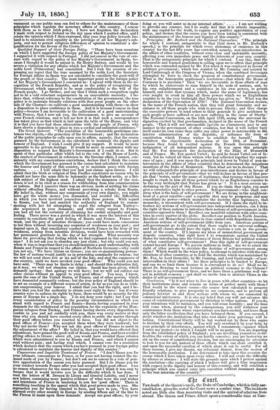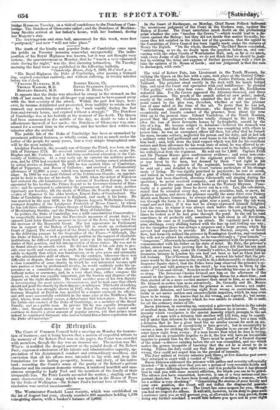tjr tuna
Tan death of the Queen's uncle, the Duke of Cambridge, which is fully nar- rated below, gives the rest of the Court news a sombre tone. The incidents noted are little else than mourning visits and the arrival of relatives from abroad. The Queen and Prince Albert spent a considerable time at Cam- bridge House 011 Tuesday, on a visit of condolence to the Dutchess of Cam- bridge. The Dutchess of Glum:ester called ; and the Diitehees of Mecklen- burg Strolitz arrived at her father's house, with her husband, during her Majesty's stay.
The drawingroom and state ball, announced for this week, were first " postponed," and now "will not take place." , The death of the kindly and popular Duke of Cambridge came upon the public on Tuesday morning somewhat unexpectedly. The indis- position of his Royal Highness was known, but it was not thought very serious ; the announcement on Monday, that he "was in a very exhausted state during the night," was the first alarming intimation. On Tuesday morning the fatal issue was published in the following bulletin. "Cambridge House, July 8, 1850, 10 o'clock p.m. "His Royal Highness the Duke of Cambridge, after passing a tranquil day, expired somewhat suddenly, and without suffering, at twenty minutes before ten o'olock.
"FRANCIS HAREINS, M.D. ROBERT Kira; Ch. THOMAS WATSON, M.D. HENRY STANHOPE ILLINGWORTH, Ch. RICHARD BRIOHT, M.D. EMU:). H. firms, Ch."
It appears that the Duke was attacked by cramp in the stomach on the 13th of last month, but that all danger was supposed to have passed away With the first severity of the attack. Within the past few days, how- ever, he became debilitated and prostrated, from inability to retain on his stomach any nourishing substance ; he "sank rapidly during the last four-and-twenty hours, and expired without a struggle." The Dutchess of Cambridge was at his bedside at the moment of his death. The Queen had been summcmed in the middle of the day, no doubt to take a last affeetMnate farewell of her uncle ; the Dutchess of Gloucester was sum- moned for a second time in the evening, and her brother died within ten minutes after she arrived.
The public life of the Duke of Cambridge has been so unmarked by prominent political features, so wholly social, and yet so much under the notice of the people for many years, that a very simple biographical note will be the most suitable.
Adolphus Frederick, the seventh son of George the Third, was born on the 24th of February 1774. He received tutorial education at Kew, under Dr. Hughes and Mr. Cookson, and a finishing academical education at the Uni- versity of Gottmgen. At a very early age he entered the military profes- sion, end by 1794 had reached the grade of Colonel, having earned promotion by actual service at Dunkirk. In 1801 he was created Duke of Carnbridg,e, L..1 of Tipperary, and Baron of Culloden ; and received a Parliamentary allowance of 12,000/. a year; which was increased to 27,0001. on his mar- riage. In 1805 he was made Colonel of the Coldstream Guards ; an appoint- Ment he held to the day of his death. In 181B, when the defeat of Napoleon had restored the old boundaries of the nations of Northern Europe, he was appointed by his brother the Prince Regent to be Governor-General of Han- over ; and he continued to administer the government of that state, neither rigorously nor harshly, till the death of William the Fourth opened the sue- ecesion of Hanover to his elder brother, Ernest Duke of Cumberland. The Duke of Cambridge then returned to England, and made it his home. He was married in the year 1818, to the Princess Augusta Wilhelmina Louisa, youngest daughter of the Lnidgrave Frederick of Hesse Cassel ; by whom he has left three children—Prince George of Cambridge the Grand utehess of Mecklenburg Striae, and the Princess Mary of Cambridge. In politics the Duke of Cambridge was a mild conscientious Conservative : he respectfully, dissented from the Free-trade measures of recent days ; he opposed Lord John Russell's measure in favour of the Jews, but he voted for the increase of the Maynooth Grant. His last appearance in Parliament was in support of the Bishop of London's bill to create an ecclesiastical Corwt of Appeal. The social aspectof the Duke's character is fairly portrayed in The following passage by the biographer of the Tenes—"Although, like the Duke of Sussex, he took a prommcut position in the support of charitable institutions, he differed greatly from that prince in his management of the duties of that position, and his interpretation of those duties. He was net to be found always in smooth water. He did not think it his sole duty to pre- side over turtle and venison or to angle for bank-notes. He did not seek solely to dignify that which was harmonious, or to give grace and solemnity to the-administrative skill of others. On the contrary, wherever there was difficulty or dispute, there was the Duke of Cambridge in the midst of it. If a close committee of some charity in which he was interested became split into parties or turn by professional rivalry, he would suddenly make his rip- pearance on a committee-day, take the chair as president of the charity ' without notice or ceremony, and, in a very short time, either compose the quarrel, or, what was equally important, put the burden and disgrace of the dispute on the right shoulders. He would sacrifice none of his own dignity in investigating the most minute circumstances and he took care that others should not peril the charity by their disputes or intrigues. This habit of rushing into the breach was strongly shown in 1847, when the very existence of the German Hospital at Dalston was perilled by a dispute amongst its officers, and still mere successfully exhibited in the same year at the Middlesex Hos- pital, where, from similar causes, a disturbance had taken place. Such were the habits and conduct of the Duke of Cambridge, as a member of the Royal Family, and as a public man. In private life he was equally irreproach- able and, though. many members of our Royal Family have earned and I continue to deserve a great amount of popular esteem, yet that prince must indeed be considered fortunate who leaves behind him a fairerreputatMn than the Duke of Cambridge."



























 Previous page
Previous page